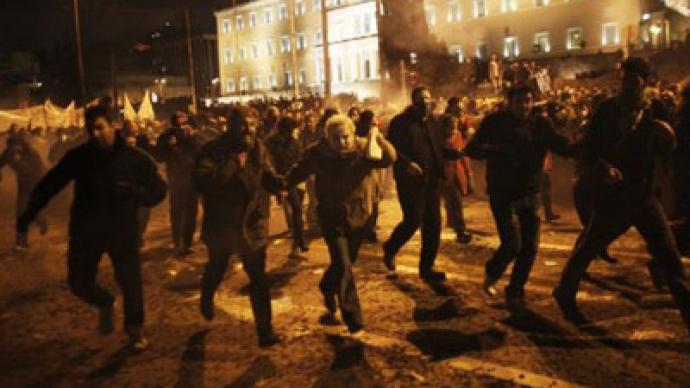Eurozone finance ministers have reached a deal for a second 130-billion-euro bailout for crisis-stricken Greece. The country’s debt will also be lowered by private holders who agreed to face value loss of 53.5 per cent on their bonds.
The agreement’s aim is to reduce the country’s debt from 160 per cent of GDP to 121 per cent by 2020. Without an additional financial shot in the arm Greece may go into a technical default as early as March 20, when the country has to pay 14.5-billion-euro worth of redeemed bonds. "We are making every effort so that a new program will be a success and will no longer be subject to recurrent slippages," said Jean-Claude Juncker, who chairs the meetings of eurozone finance ministers, adding it would need all relevant parties to work together.Juncker added that the troika's (European Central Bank, International Monetary Fund and the European Commission) presence would be reinforced in Athens to stop any potential deviation away from the agreement."It would be no exaggeration to say that today is an historic day for the Greek economy. With today's decisions we are given an opportunity to move towards stability away from the uncertainty we've had recently," said Greek Prime Minister Lucas Papademos at a press conference in Brussels. "A lot has to be done to complete the actions required to enter into a credit agreement that is scheduled for early March." The IMF will consider its participation in the bailout program in the second week of March, according to the head of the IMF, Christine Lagarde. While the ECB will distribute the profits derived from its purchases of Greek bonds to national central banks, who will give the money to their governments to bolster Greece’s aid package, reports Bloomberg.The deal was struck early Tuesday following an overnight negotiation session that went for more than 12 hours behind closed doors. The rescue package is the second major foreign loan for Greece, since the 110-billion-euro bailout from the EU and the IMF that was approved on May 1, 2011.The new bailout has enabled private holders of Greece's debts – mostly banks and investment funds – to agree to more substantial losses than previously expected. Investors had agreed to a 50 per cent nominal write-down, which equated to around a 70 per cent loss on the net present value of the debt, according to Juncker. This deal is a critical part of lowering the country's debt so that it can eventually be paid off. Earlier, Greek party leaders pledged to follow a deeply unpopular austerity program passed by the parliament on February 13. Greece managed to cut 15,000 public-sector jobs and lower the minimum wage by 20 per cent, thus reducing budget spending by 325 million euro.The measures brought about some of the worst violence Athens has seen in years. As Greece continues to flirt with bankruptcy protests have become almost a daily occurrence.Greenwave TV creator Christopher Greene told RT that riots will not change anything as the outcome of the debt crisis is already set in stone.“They are dealing with the enormous problem. We are looking at the 40 per cent unemployment rates, and 50 per cent in some European countries among the youth,” Greene says. “There is no bailout measure that will prevent the collapse of Europe.”
Political analyst Rodney Shakespeare thinks that austerity measures will not change anything and Greece will fail to cut its debt.“These are manipulations that justify the banking occupation of Greece,” he asserts saying that the people of Greece “are being smashed into the ground their sovereignty is being destroyed their assets are being sold off they are being put into poverty and dept peonage not just for the rest of their lives, but for their children and grandchildren’s lives. The whole thing is a fraud.” Shakespeare believes that a solution for Greece is to get out of the eurozone and go on its own, just like Iceland does.

